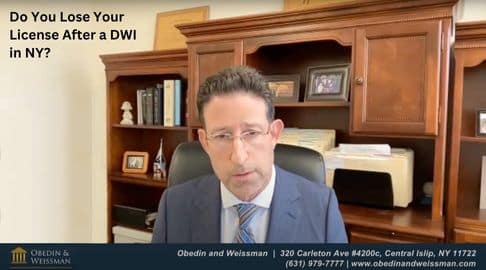Getting arrested for Driving While Intoxicated (DWI) in New York is a serious legal matter—and one of the most immediate consequences is often the loss of your driver’s license. Whether you’re facing a misdemeanor or felony charge, a DWI conviction in New York can lead to either a suspension or a revocation of your driving privileges. Understanding how and when you might lose your license is essential if you want to protect your freedom to drive and avoid long-term disruptions to your life.
Driver’s License Suspension vs. Revocation for DWI in New York
When it comes to DWI charges, New York law enforces penalties that can either suspend or revoke your driver’s license, depending on the circumstances of the case. This is one of the most significant penalties most people face after being arrested for DWI.
Here’s the difference:
-
License Suspension means your ability to drive is temporarily halted. After the suspension period, your license is typically reinstated automatically.
-
License Revocation means your license is voided, and you must reapply to the New York State Department of Motor Vehicles (DMV) to regain your driving privileges.
How Long Do You Lose Your License After a DWI in NY?
The duration of a license suspension or revocation depends on the type of DWI offense:
-
Misdemeanor DWI conviction: Typically results in a 6-month license revocation
-
DWAI (Driving While Ability Impaired): If the charge is reduced, this usually leads to a 90-day license suspension
-
Felony DWI conviction: Often results in a 1-year revocation of your license, especially if there is a prior DWI conviction within the last 10 years
These penalties are standard under New York DWI laws, but outcomes may vary depending on your driving history, BAC levels, and whether the case is resolved by plea bargain or trial.
When Can a DWI Be Reduced to Avoid License Revocation?
In many DWI cases, an experienced DWI defense attorney can negotiate a reduction in charges. One of the most common goals is to reduce a misdemeanor DWI to a DWAI. The benefits of this outcome include:
-
Avoiding a criminal record, since DWAI is considered a traffic infraction, not a crime
-
Minimizing driver’s license penalties, with a 90-day suspension instead of a 6-month or longer revocation
-
Simplified license reinstatement, since a suspension doesn’t require reapplication through the DMV
If your DWI charge is successfully reduced to a DWAI, you are not required to reapply for a new license—your current one will be reinstated automatically once the suspension ends and any requirements are satisfied.
What Happens to Your License After a Felony DWI in NY?
A felony DWI in New York—typically charged when there is a prior DWI conviction within the past ten years—carries more severe penalties. A conviction for felony DWI almost always includes:
-
A one-year license revocation
-
Mandatory reapplication through the DMV, which may include fees, proof of rehabilitation, or completion of alcohol education programs
If you are convicted of felony DWI, your driving privileges will be revoked for at least a year, and you will have to wait until that period ends before seeking reinstatement. The DMV will review your application and history before granting a new license.
Can You Lose Your License Before the DWI Case is Resolved?
Yes. In some cases, your license may be suspended immediately following your arrest—even before a conviction is entered. This typically happens if:
-
You refused to take a breath or blood test
-
The court issues a suspension at arraignment due to the severity of the charges or your driving history
Early legal intervention is critical in these situations. A seasoned DWI defense attorney may be able to fight the immediate suspension or help you qualify for limited driving privileges during the case.
Summary: What to Expect With DWI License Penalties in NY
Here’s a quick breakdown of license-related consequences for DWI in New York:
-
First-time misdemeanor DWI conviction: 6-month revocation (must reapply for license)
-
Reduction to DWAI: 90-day suspension (automatic reinstatement)
-
Felony DWI conviction: 1-year revocation (must reapply through DMV)
-
Refusal to take a chemical test: May lead to immediate suspension and separate DMV penalties
Why Hiring a New York DWI Lawyer Matters
Losing your license is more than just an inconvenience—it can affect your job, your family life, and your ability to maintain daily responsibilities. That’s why working with a defense attorney who understands New York DWI laws is essential. Ira Weissman stresses that not all attorneys have courtroom experience or the negotiation skills required to secure the best outcome.
At Obedin & Weissman, we’ve represented hundreds of DWI clients throughout Suffolk County and across Long Island. We know how to approach prosecutors, challenge unlawful arrests, and protect your right to drive. Whether you’re seeking to avoid a full license revocation or hoping to secure a favorable plea deal, our firm is here to help.
Call Us if You’ve Been Arrested for DWI in New York
So, do you lose your license after a DWI in New York? Yes—most people do. But how long you lose it, and whether it’s a suspension or a revocation, depends on how your case is handled. With the right legal team, it’s possible to minimize the impact on your driving privileges—and your life.
If you or someone you love has been arrested for DWI in New York, call Obedin & Weissman. We are available 24/7 to answer your questions, provide guidance, and, if necessary, represent you in court the very next day. Don’t leave your future—or your driver’s license—in the hands of fate. Let our experience work for you.


